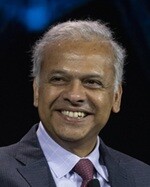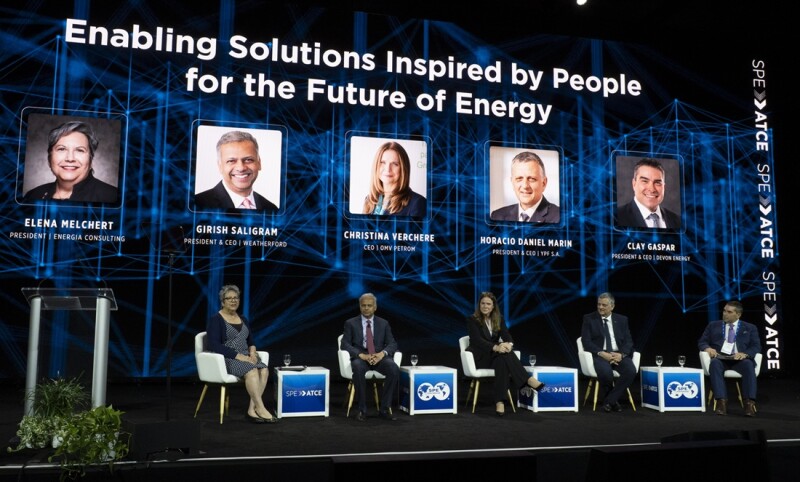The easy oil is in the past, but executives remain optimistic the industry can deliver the future energy the world needs.
Moving forward, the expectation is that oil and gas will continue to provide the majority of the energy mix, but as the world transitions toward renewables, pragmatism is important, speakers said on 20 October during the opening plenary session at SPE’s Annual Technical Conference and Exhibition in Houston. The speakers said that collaboration and innovation will help create technology breakthroughs and reinvention could enable the industry to remain relevant.

The oil industry has long been characterized as “the bad guys” with the public grudgingly acknowledging they need energy, Devon Energy President and CEO Clay Gaspar said. It’s time to change viewpoints around energy, he said, adding that energy scarcity is enabling rational conversations on the topic.
Essentially, he said, there are three foundational truths about energy: Energy is important; energy demand is growing; and energy is hard.
“When you can get the foundational truths agreed to, then you can start having much more productive and intelligent conversations about how we do things,” he said.
He compared energy poverty to nutritional poverty. In a state of abundance, it’s easy to focus on finding a higher quality version of protein, but, in scarcity, nothing matters but acquiring calories. In energy abundance, it’s easy to take for granted the fact that flipping the “magical switch on the wall” makes the lights come on.
He added that, with the correlation between energy consumption and quality and quantity of life, the industry is focused on producing energy for the world’s 8 billion people.

OMV Petrom CEO Christina Verchere said the past few years—which have seen war in Ukraine and Europe’s focus on decarbonization contribute to “gas prices we had never seen before”—have helped clarify the importance of energy security.
“In a world of environmental change, there is a big economic question, and that is, ‘What can people actually afford?’” she said.
There must be some pragmatism about what the energy transition looks like to ensure energy security and affordability are both possible, she added.
Technology breakthroughs, she said, can help with that.

Weatherford President and CEO Girish Saligram said such breakthroughs require commitment to protecting investments in research and creating a framework where innovation is possible.
“The world is moving at a breakneck pace. Innovation does not happen because somebody woke up one day and said, ‘Let’s innovate today,’ ” he said. “It’s happened because of a very purposeful set of initiatives and focused people who’ve driven that over several weeks, months, years, decades.”
Both curiosity and collaboration are critical for technology breakthroughs, he said.
“It’s not about, ‘Hey, I'm going to do it my way.’ We share best practices,” he said. “Every time something happens, we all try to learn from it. We are very transparent about those things. I think that coupling of curiosity and collaboration and saying, ‘How do we bring the best of everything that each us has to offer together,’ that is what will provide the ability for individuals and organizations to succeed.”

Horacio Marin, president and CEO of YPF, said collaboration makes major efforts possible. Flying solo on a project makes it more expensive, but combining resources makes it possible to achieve larger results.
And personnel contribute best when their passions and values are aligned with the effort, he said.
“We need emotion because we are human beings,” he said. “When you have the emotions, people go the extra mile.”
An Uncomfortable AI Truth
Verchere said those who lean into using artificial intelligence (AI) are not cheating but rather freeing themselves up to use their brains for other things, much in the way calculators allowed people to move from having to do basic math.
Gaspar said the uncomfortable truth about AI is that it will eliminate some jobs.
“I think that technically savvy, sophisticated users of AI will be multiple times more powerful,” he said. “There are some folks that are on the sidelines saying, ‘Hey, this isn’t really for me. I think I'm going to wait it out.’ They will be the people that really get left behind.”
And becoming AI-capable is much easier than becoming proficient in data analytics or high-end computer programming, he said.
“The moat from all of us becoming very sophisticated in AI is nonexistent. If you ever want to figure out how to leverage AI, you should ask AI, ‘Here’s my job, this is what I do. How can I use it?’ ” Gaspar said.
AI is being used for different applications in the oil patch, such as safety on rigs and automating activities, Saligram said.
AI-enabled cameras can detect safety violations or risks and send alerts to the rig floor, compared with waiting for a human to spot a safety violation or waiting for an incident to occur, he said.
“That’s radically improved our safety performance,” he said, calling it a technology he believes will soon be ubiquitous.
AI and other technologies are enablers that allow the industry to develop more resources and generate the energy the world needs, Gaspar said. That means the industry will need to lean into technology innovation to help it provide that energy.
“We drilled the easy stuff yesterday. The harder stuff is tomorrow,” he said.
And time and time again, it’s been claimed that oil in the US has played out, he said. Each time, however, the oil industry has found ways to prove it’s still relevant, including seeking hydrocarbons in other locations and ever-deeper waters.
“And our industry has completely reinvented itself around resource plays, and I think that’s where we sit today. I think technology is an enabler to us to continue to figure out how do we develop more and more of this incredible resource from around the globe to generate that power is what really is the call to arms today,” Gaspar said.


